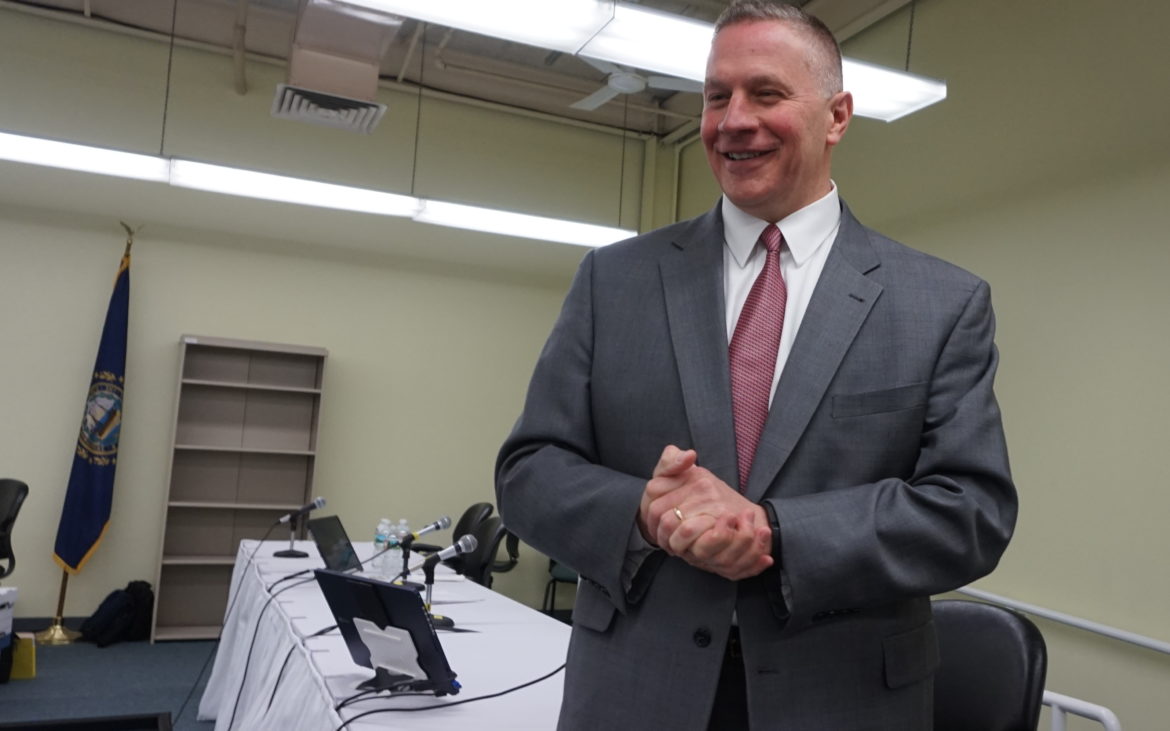By GARRY RAYNO
CONCORD — Many opponents of the Northern Pass project want the entire 192 miles of transmission line between Canada and Deerfield buried, but on Friday landowners said a decision two years ago to increase the buried portion to 60 miles was ill-conceived and based on political pressure rather than a thorough study.
For the second day of adjudicative hearings on the $1.6 billion project before the Site Evaluation Committee, Eversource New Hampshire President William Quinlan testified under oath.
Easton abutters Carl Lakes questioned how “clean” the Hydro-Quebec energy is noting the large hydro projects cause “pollution, death and destruction.’
He also accused the company of trying to buy influence with its $20 million allocation to the state Public Utilities Commission for energy efficiency projects and telling towns along the route the company would not seek abatements if their assessments were reasonable.
“You’re attempting to buy off the PUC and towns,” Lakes said, but Quinlan denied that accusation saying the money for energy efficient projects is included in a settlement with state regulators and the abatement offer was an attempt to put the issue to rest.
The day before Quinlan faced questions about the project’s cost and who would pay for it, a $200 million economic development fund and whether it would help lower New Hampshire residents’ and businesses’ electric bills.
The project, nearly a decade in the development stage, would carry Hydro-Quebec energy through New Hampshire to energy hungry southern New England.
The project has been fought by homeowners, landowners, conservationists and environmentalists who say it will adversely impact the state in many ways, but supported by business groups, trade unions and large electric users who say it will bring much needed clean, renewable energy to the region.
On Friday Quinlan faced questions by intervenors with concerns about specific sections in the North Country including the much studied Coos Loop and the buried line along existing roadways from the White Mountain National Forest to Plymouth.
Franconia resident Walter Palmer, a landowner along the buried portion of the line, said instead of the five years of work on the original proposed route, only about a year was spent working on the proposal to bury the line through the White Mountain National Forest and in areas on both sides of the forest.
“You’re going to be burying lines right through the center of some active little towns in New Hampshire and in the front yards of residences along those roads,” Palmer told Quinlan. “I feel this is a very ill-conceived plan that was adopted precipitously and without adequate study.”
But Quinlan said the company spent a year focused on the plan using a broad range of criteria to help make the decision noting that the power lines had to be downsized from 1,200 to 1,090 megawatts.
Palmer asked for documents used to make the decision and both Quinlan and Northern Pass attorney Barry Needleman said those documents are readily available and number in hundreds of thousands.
Attorney Arthur Cunningham representing landowners in Stark questioned whether Hydro-Quebec was willing to pay its share of the project based on news reports in Canada.
Quinlan said the two companies released a statement several weeks ago saying they continue to be committed to the project and the Transmission Service Agreement between the two companies remains in effect.
“That was intended to clear up any confusion out there in the media,” Quinlan said.
Pushed for details about the project costs, Quinlan said there is some commercially sensitive information that needs to be confidential as the two companies respond to a Massachusetts clean energy initiative. The two companies will present their bid by mid-July.
Quinlan was also questioned about upgrading the Coos Loop distribution system in the North Country.
Company spokesman Martin Murray said the system is sufficient to meet customers’ needs but several power producers in the North Country want to use it to connect to other grids in New Hampshire and Vermont and it is not capable of moving all the electricity the generators could produce.
Quinlan told the committee the loop would be upgraded as part of Northern Pass if it is approved. It is traditionally up to the power producers to upgrade the system if they want to use it, he said.
Next week the hearings continue Monday, Tuesday and Wednesday.
Monday and Tuesday Kenneth Bowes, Eversource Vice President of Engineering, who is responsible for engineering activities for Eversource’s electric transmission and distribution system, and Michael Auseré, Certified Public Accountant and Vice President of Energy Planning and Economics for Eversource, will testify about Northern Pass’ financial capability to construct and operate the project.
Wednesday a public health panel will be before the SEC.
Garry Rayno can be reached at garry.rayno@yahoo.com.
See past stories on Northern Pass’ adjudicative proceedings:
Day 1 : William Quinlan testifies






